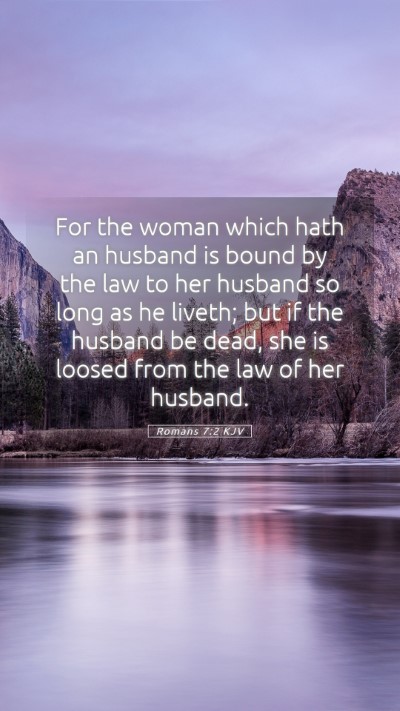Old Testament
Genesis Exodus Leviticus Numbers Deuteronomy Joshua Judges Ruth 1 Samuel 2 Samuel 1 Kings 2 Kings 1 Chronicles 2 Chronicles Ezra Nehemiah Esther Job Psalms Proverbs Ecclesiastes Song of Solomon Isaiah Jeremiah Lamentations Ezekiel Daniel Hosea Joel Amos Obadiah Jonah Micah Nahum Habakkuk Zephaniah Haggai Zechariah MalachiRomans 7:2 Meaning
What is the meaning of Romans 7:2?
For the woman which hath an husband is bound by the law to her husband so long as he liveth; but if the husband be dead, she is loosed from the law of her husband.
Romans 7:2 Bible Verse Meaning
Understanding Romans 7:2
The verse Romans 7:2 states: "For the woman which hath a husband is bound by the law to her husband so long as he liveth; but if the husband be dead, she is loosed from the law of her husband." This passage is often explored for its deeper meanings regarding law, marriage, and spiritual freedom. Below, we provide an in-depth analysis utilizing insights from Matthew Henry, Albert Barnes, and Adam Clarke, aimed at enhancing your Bible verse understanding and offering clarity around Bible verse interpretations.
Context and Background
Understanding the historical and cultural context of this passage is essential for interpretation. Paul, in his epistle to the Romans, addresses the relationship between law and grace while using the metaphor of marriage to illustrate these concepts.
Scripture Analysis
- Marital Law: The verse establishes that a married woman is bound to her husband by the law as long as he is alive, reflecting the sanctity and permanence of marriage as viewed in Roman culture.
- Death and Release: The death of a spouse liberates the surviving spouse from the constraints of that marriage, a concept that signifies not just a literal freedom but a larger theme of redemption from the law through death.
Bible Verse Commentary
According to Matthew Henry, this passage highlights the unbreakable bond of marriage, elevating its importance and sustainability as ordained by God. He emphasizes that this relationship is designed to be lifelong, reflecting God's covenant with His people.
Albert Barnes explains that Paul is using this analogy to teach that believers are no longer under the law once they have died to it through Christ. This highlights the transition from the old covenant of the law to the new covenant of grace.
Adam Clarke adds to this perspective by stating that the law binds individuals within the context of their earthly relationships, but through Christ's sacrificial death, believers gain liberation not only from sin but also from the law's penalties.
Significance and Applications
This verse serves as a profound theological statement regarding the interplay between law and grace, stressing that adherence to the law does not equate to righteousness. The application of this scripture can lead one to a deeper understanding of how the principles of God's law are fulfilled in Christ. It encourages believers to grasp their freedom from the legalistic chains of sin through the death and resurrection of Jesus.
Application of Scripture
- This verse invites reflection on personal relationships and commitments, highlighting the importance of faithfulness.
- It encourages believers to evaluate how they perceive their relationship with the law in light of Christ's work.
- Furthermore, it ignites discussions in Bible study groups and among Bible study resources regarding how to live out this newfound freedom in daily life.
Cross References
For further study, consider the following related scriptures:
- Galatians 3:23-25 - Discusses being free from the law.
- Ephesians 2:15 - Talks about abolishing the law in Jesus.
- Matthew 19:3-9 - Jesus’ teachings on marriage and divorce.
Conclusion
Romans 7:2 offers rich insights into the transition from law to grace and reflects deeper theological truths about the nature of relationships both on an earthly and spiritual level. It provides ample material for Bible study lessons and Bible study guides as believers seek to understand Scripture and the implications of living in Christ.


